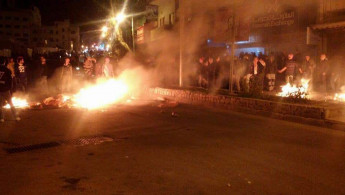Riots break out in Jordan over bread price hikes
Bread prices rising 60 percent spark violence in a Jordanian city as protesters clash with security forces.
2 min read
Protesters blockaded the streets in the city of As-Salt (TNA)
A demonstration protesting price hikes in the Jordanian city of As-Salt, west of Amman, descended into a riot as protesters burned tyres and clashed with security forces over the weekend.
Witnesses from the city said the march, which rejected tax increases and subsidies cuts, began peacefully before protesters barricaded roads in the city centre.
Demonstrators called for the otherthrow of Prime Minister Hani al-Mulqi's government, and for parliament to be dissolved, while they urged King Abdullah to intervene and abolish the recently imposed increased taxes on goods.
Security forces attempted to disperse the demonstrators while civil and tribal leaders attempted to calm the situation, with protests now ongoing for four days. The demonstrations gained momentum after the king visited the city to meet with political and military figures at the home of former intelligence chief Nazir Rashid.
"The protests are a message to the government to reverse the decision to raise prices and increase taxes, leading to restrictions on citizens," said MP Moataz Abu Ruman.
Abu Ruman told The New Arab that the government’s approach could lead to increased demonstrations.
The protests followed government policies which increased the tax on more than 150 commodities and lifting government subsidies on bread, the price of which has increased by as much as 60 percent. The move, which is part of a drive to tackle the country's budget woes, is the first of its kind in more than two decades.
The price of fuel and electricity has also been raised, which Abu Ruman described as a "government provocation of citizens". The economic policies are part of a major package of IMF-guided tax rises aimed at gradually lowering record public debt.
The last time Jordan significantly raised bread prices, in 1996, protests broke out across the country against the move. The increase was ushered in by requirements for new credit also set by the International Monetary Fund.
Witnesses from the city said the march, which rejected tax increases and subsidies cuts, began peacefully before protesters barricaded roads in the city centre.
Demonstrators called for the otherthrow of Prime Minister Hani al-Mulqi's government, and for parliament to be dissolved, while they urged King Abdullah to intervene and abolish the recently imposed increased taxes on goods.
 |
The protests are a message to the government to reverse the decision to raise prices and increase taxes |  |
Security forces attempted to disperse the demonstrators while civil and tribal leaders attempted to calm the situation, with protests now ongoing for four days. The demonstrations gained momentum after the king visited the city to meet with political and military figures at the home of former intelligence chief Nazir Rashid.
"The protests are a message to the government to reverse the decision to raise prices and increase taxes, leading to restrictions on citizens," said MP Moataz Abu Ruman.
Abu Ruman told The New Arab that the government’s approach could lead to increased demonstrations.
The protests followed government policies which increased the tax on more than 150 commodities and lifting government subsidies on bread, the price of which has increased by as much as 60 percent. The move, which is part of a drive to tackle the country's budget woes, is the first of its kind in more than two decades.
The price of fuel and electricity has also been raised, which Abu Ruman described as a "government provocation of citizens". The economic policies are part of a major package of IMF-guided tax rises aimed at gradually lowering record public debt.
The last time Jordan significantly raised bread prices, in 1996, protests broke out across the country against the move. The increase was ushered in by requirements for new credit also set by the International Monetary Fund.
Follow us on Twitter: @The_NewArab





 Follow the Middle East's top stories in English at The New Arab on Google News
Follow the Middle East's top stories in English at The New Arab on Google News
![Israeli forces ordered bombed Gaza's Jabalia, ordering residents to leave [Getty]](/sites/default/files/styles/image_330x185/public/2176418030.jpeg?h=a5f2f23a&itok=_YGZaP1z)

